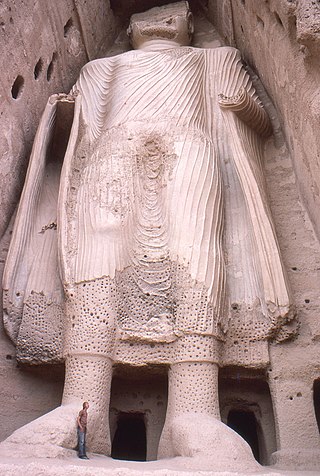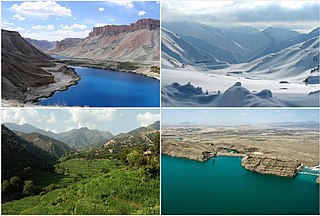Related Research Articles

Balkh is one of the 34 provinces of Afghanistan, located in the north of the country. It is divided into 15 districts and has a population of about 1,509,183, which is multi-ethnic and mostly a Persian-speaking society. The city of Mazar-i-Sharif is the capital and largest city of the province. The Mawlana Jalaluddin Mohammad Balkhi International Airport and Camp Marmal sit on the eastern edge of Mazar-i-Sharif.

Logar is one of the 34 provinces of Afghanistan, located in the eastern section of the country. It is divided into 7 districts and contains hundreds of villages. Puli Alam is the capital of the province. As of 2021, Logar has a population of approximately 442,037 people, most of whom are ethnic Pashtuns and Tajiks.

Nangarhār, also called Nangrahar or Ningrahar, is one of the 34 provinces of Afghanistan, located in the eastern part of the country and bordering Logar, Kabul, Laghman and Kunar provinces as well as having an international border with Pakistan. It is divided into 22 districts and has a population of about 1,735,531, the third highest of the country's 34 provinces. The city of Jalalabad is the capital of Nangarhar province. Nangarhar province is famous for its fish and karahi dishes.

Parwan also spelled Parvan is one of the 34 provinces of Afghanistan. It is the largest province of the Greater Parwan region and has a population of about 751,000. The province is multi-ethnic and mostly rural society. The province is divided into ten districts. The town of Imam Abu Hanifa serves as the provincial capital. The province is located north of Kabul Province and south of Baghlan Province, west of Panjshir Province and Kapisa Province, and east of Maidan Wardak Province and Bamyan Province. The province's famous tourism attraction is the Golghondi Hill, also known as “the flower hill,” located in Imam Azam about an hour away from the capital city of Kabul. After Panjshir this province has been considered as one of the main raising points of Afghanistan War against Soviets.

Wardak, also called Wardag is one of the 34 provinces of Afghanistan, located in the central region of Afghanistan. It is divided into eight districts and has a population of approximately 500,000. The capital of the province is Maidan Shar, while the most populous district in the province is Saydabad District. Wardak is known for one of its famous high peak mountain known as. In 2021, the Taliban gained control of the province during the 2021 Taliban offensive.
The Mohmand or Momand is a prominent tribe of Pashtun people.

Hezb-e Islami Khalis is an Afghan political ex-Mujahideen movement under Mohammad Yunus Khalis, who separated from Gulbuddin Hekmatyar's Hezb-e Islami and formed his own resistance group in 1979. The two parties were distinguished as Hezb-e Islami Gulbuddin and Hezb-e Islami Khalis, after the names of their respective leaders.

Buddhism, a religion founded by Gautama Buddha, first arrived in modern-day Afghanistan through the conquests of Ashoka, the third emperor of the Maurya Empire. Among the earliest notable sites of Buddhist influence in the country is a bilingual mountainside inscription in Greek and Aramaic that dates back to 260 BCE and was found on the rocky outcrop of Chil Zena near Kandahar.
Daikundi also spelled as Dai Kundi, is one of the major tribes of Hazara people in Afghanistan mostly in Hazaristan (Hazarajat) region.

The Mangal are a tribe of the Pashtun people residing in eastern Paktia and adjacent Khost provinces of Afghanistan, and in the town of Tari Mangal, district Kurram, Pirdil Khel, Fatima Khel and Surrani of Bannu Pakistan. Their land constitutes the northeastern part of the Loya Paktia region. The Mangals descend from Karlani Pashtun lineage.

Mohammad Jan Abdullah Wardak was an Afghan politician and former Mujahideen commander. He served as a government Minister and Governor of Logar Province.
Sayed Abdul Karim Hashimi is an Afghan politician. He is a former Governor of Logar Province, he served from December 2005 to July 2007.

Bādghīs is one of the thirty-four provinces of Afghanistan, located in the northwest of the country, on the border with Turkmenistan. It is considered to be one of the country's most underdeveloped provinces, with the highest poverty rate. The capital is Qala e Naw, while the most populous city and the district are Bala Murghab. The ruins of the medieval city of Marw al-Rudh, the historical capital of the medieval region of Gharjistan, are located in the province near the modern city of Bala Murghab.

Tourism in Afghanistan is regulated by the Ministry of Information and Culture. There are at least 350 tourism companies operating in Afghanistan. Tourism was at its peak before the 1978 Saur Revolution, which was followed by the decades of warfare. Between 2013 and 2016, Afghan embassies issued between 15,000 and 20,000 tourist visas annually. Following Taliban's return to power in August 2021, visitor numbers gradually increased from 691 in 2021 to 2,300 in 2022, reaching 7,000 in 2023.

The Wardak or Wardag are a tribe of the Pashtun people. That mainly live in the Wardak Province of Afghanistan. They migrated to the Wardak province in around 1730. Although they are mainly found in Afghanistan, they can also be found in Peshawar, Attock and Dir in Khyber Pakhtunkhwa province of Pakistan.
The Andar are a Ghilji Pashtun sub-tribe. The Andar occupy nearly the whole of the extensive district of Shalgar south of Ghazni The Andar were traditionally known for their skill in the construction and maintenance of large karez. More concentrated in Ghazni Province, they have also a significant presence in Paktia. During the 19th century they joined in the Ghilji revolt and many were summarily sent into internal exile. Somewhat inexplicably, they allied themselves for a time with the Harakat-i Islami, during the anti-Soviet campaign. In fact, there were two Mujaheddin parties named Harakat-i Islami Afghanistan, the other and far more significant party was originally a 'united front' of mainly Hezb-i Islami and Jamiat-i Islami, that collapsed after only a few months, leaving behind a significant party that was in many ways a precursor to the present day Taliban movement. A majority of the Andar tribe were affiliated with this 'Harakt-i Islami' and it is notable that the leader of this united front and later party, Mawlawi Mohammad Nabi Mohammadi was Andar by tribe. Similarly, the senior Mawlawi Mansoor was Andar too. Mansoor's son Saifurrahman Mansoor was later an important figure and military leader in the Taliban movement.
The Bache Ghulam,, is a tribe of Hazara people, largely found in Sangi Takht District of Daykundi Province, Afghanistan. They are a subtribe of the Daizangi.

Sarwar Ahmedzai is a citizen of Afghanistan who was a presidential candidate in 2009 and 2014. He served as Deputy National Security Advisor to President Ashraf Ghani until the overthrow of his government by Taliban.
The Kharwar Dam, referred to as Band-e Kharwar in Dari and Kharwar Band in Pashto, is located on the Charkh River in the Kharwar District of Logar Province in Afghanistan. It is a rock-filled gravity dam, with a height of 36 m (118 ft) and length of 140 m (460 ft). Its reservoir has the capacity to store about 17 million cubic meters of water.
References
- ↑ "Logar Executive Summary" (PDF). Program for Culture and Conflict Studies at the Naval Postgraduate School.
- ↑ Abdul Maqsud Azizi (2012-02-25). "MP's son kidnapped in Logar". Pajhwok Afghan News. Archived from the original on 2016-03-01. Retrieved 2012-04-16.
Khalid, the son of Haji Ali Mohammad, was kidnapped on Friday evening in the Padkhwab-i-Shana area on the outskirts of Pul-i-Alam, the provincial capital city, a crime branch police officer, Khan Agha, told Pajhwok Afghan News.